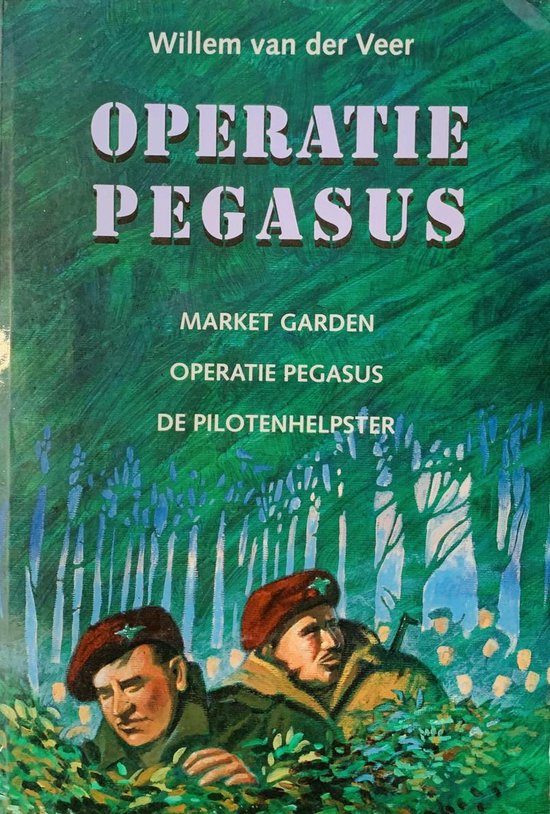Introduction
Allied pilots shot down over the Netherlands and captured by the resistance, Dutch resistance fighters who were no longer able to stay in our country and allied soldiers who escaped from German camps, were taken across the Belgian border through so-called escape lines. This was extremely risky resistance work because death penalty was the punishment for helping allied soldiers. Yet there were Dutch men and women who were committed to this cause.
Johanna Maria (Joke) Folmer (July 9th, 1923) was one of them. At the age of 18 she started with resistance work and during the war she helped over 300 men (among them 120 pilots) to escape. After her arrest, in July 1944, she was sentenced to death, because of her involvement in the “pilot rescue”. Miraculously, she escaped execution and survived the war. She received several high national and international awards for her actions.
Definitielijst
- resistance
- Resistance against the enemy. Often also with armed resources.
Images
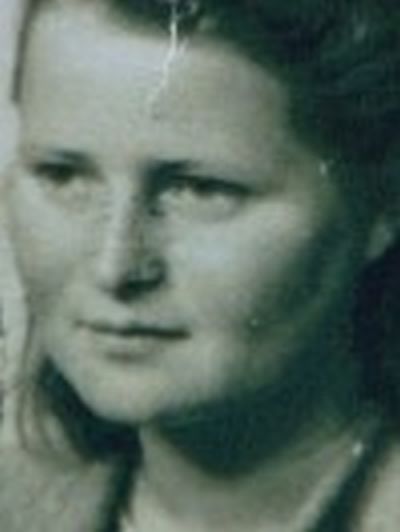 Joke Folmer at an early age. Source: www.deoorlog.nps.nl.
Joke Folmer at an early age. Source: www.deoorlog.nps.nl.Youth and first resistance work
Joke Folmer was born on July 9th, 1923, in Hoofddorp. Soon after her birth, she left for Java in the former Dutch East Indies, with her parents. Her father was working there as an administrator in a sugar factory and took his wife Elisabeth (Bep) Vrielink and daughter.
Joke lived with her family in Java until her 16th birthday. She grew up quite differently than her peers in the Netherlands. In the area where her father worked, there was no primary school and there were hardly any other Dutch families. Joke had to improvise and engage herself, which made her grow into an independent, resolute girl. Her mother committed herself to the task of teacher. She did it so well, that Joke was accepted into the high school in Bandung without any problems.
In the summer of 1939 the family moved to the Netherlands, where they settled in Zeist. They had scarcely returned when the mobilization was proclaimed. In Zeist there were many soldiers and everywhere was buzzing with rumours of an imminent German invasion.
Her parents wanted Joke to finish the schooling she had started in the Indies. That is the reason why she went to the Christian Lyceum in Zeist. She befriended a small Jewish girl named Rosette. Even after the German invasion she continued going to school with her friend. Her Jewish friend was bullied more and more and often verbally abused by the other classmates. Joke responded furiously to this. When Rosette went into hiding, in January 1941, Joke decided to leave school.
Through Bob Gaillard, a student in Delft, she became involved in the resistance. Gaillard was occupied with various resistance activities, of which organizing escape lines for people who had to flee the Netherlands was an important part. Gaillard needed reliable people to deliver messages or packages.
Joke proved to be an excellent and intelligent worker and in the first half of 1942, she did this work fearlessly. She looked discrete and girlish, making her an ideal courier. The Germans controlled everything with precision, but with women they were usually less severe. This was true, especially when it came to attractive young girls.
When she had proved her value as a message and parcel courier, she was assigned to the “bigger” work. From the second half of 1942 she escorted escaped prisoners of war, Dutch resistance fighters, who were no longer safe in their own countries and allied pilots, shot down over the Netherlands. She did this work on behalf of the illegal organization "Luctor et Emergo" which was co-founded by a Hague official of the “Rijksbureau voor de Voedselvoorziening in Oorlogstijd”, J. C. (Jan) Wannée. This organization had contacts with the British Intelligence (SOE) and the resistance in Limburg, which had already established an extensive network of escape lines. Weert was an important junction.
Definitielijst
- invasion
- Armed incursion.
- mobilization
- To make an army ready for war, actually the transition from a state of peace to a state of war. The Dutch army was mobilized on the 29 August 1939.
- resistance
- Resistance against the enemy. Often also with armed resources.
- SOE
- Special Operation Executive. British organisation during World War 2 conducting secret operations and espionage.
Pilots rescue
Guiding pilots to the Belgian border (pilot rescue) was, organisationally and emotionally, a tough job. Work had to be done in a highly disciplined and careful manner, because the smallest mistakes could have serious consequences. The language brought the biggest risks with it, because most allied soldiers did not speak a word of Dutch. In their hiding places, they were trained to say “ja” and “nee”, in addition they had to be able to pronounce the details of their false identity card flawlessly. Also their belongings were carefully checked in order to secure that they had not anything, which might give away their allied identity.
Joke’s first assignment regarding pilot rescue was transporting five Englishmen, on November 17th, from the western Netherlands to Weert (in the south). This trip went smoothly. After this successful first trip, the assignments followed in quick succession. Due to this, she had to travel a lot and she had a busy and hectic live. Not every journey went without a hitch and sometimes she narrowly escaped arrest, but in the winter of 1943 Joke Folmer could look back on many successful journies. In her first year she managed to guide hundreds of men of various nationalities safely to the south of the Netherlands, sometimes even to Belgium.
Meanwhile, the Sicherheitsdienst, was hunting intensively for illegal workers, who let many people escape from the hands of the Germans. Regularly collaborators were arrested and subjected to tough interrogations and tortures, so that more resistance workers could be arrested. From Joke’s resistance group, one after another were arrested, which made Joke wonder, practically daily, how much time there would be left for her.
However, the work had to be continued, despite of all perils it entailed. Eventually she found it too risky to continue staying overnight at her own house. Therefore she moved to a room with good friends in Amsterdam, where she felt safer than in Zeist, where many people knew her.
Definitielijst
- resistance
- Resistance against the enemy. Often also with armed resources.
Images
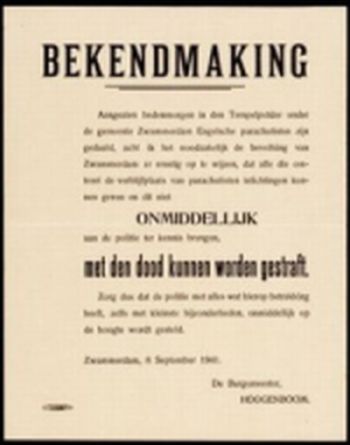 Such publications were posted on many places. The Germans knew no mercy for pilot rescuers. Source: www.archieven.nl.
Such publications were posted on many places. The Germans knew no mercy for pilot rescuers. Source: www.archieven.nl.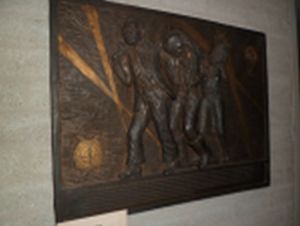 This (replica) tablet in the Nationaal Oorlogs- en Verzetsmuseum in Overloon is for the remembrance of all participants of the pilots rescue. Source: www.tracesofwar.com.
This (replica) tablet in the Nationaal Oorlogs- en Verzetsmuseum in Overloon is for the remembrance of all participants of the pilots rescue. Source: www.tracesofwar.com.Arrest and conviction
Joke rarely came home to her parents, because she lived far away from Zeist and because the resistance work claimed all her time. At long last, Joke was to able relax and that is why she made an appointment with her mother on Wednesday, April 28th, 1944, at Amsterdam Central Station. Together, they would spend that day in Amsterdam.
At the moment she hugged her mother, who came from Utrecht by train, she and her mother were gripped roughly and arrested by the SD. Joke was taken to the Scheveningen prison (known as the Oranje Hotel) at the Haagse Pompstationweg. Her mother ended up as a hostage in camp Vught.
After a few days she was taken from her cell, for the first time, to be interrogated. Joke did not let herself be misled during the interrogation and did not confess anything. However, she kept on asking what the exact reason for her arrest was. Her interrogators did not like the tone she took and therefore she was imprisoned again. After two days she was taken to the interrogation room, where she managed to persuade the Germans to read over the charges against her. Then it became clear that the Germans were only aware of her involvement in the first trip with five Englishmen, on November 17th, 1942. In fact, later on, these five allies were arrested, in Brussels and Paris. One of the resistance fighters had confided in a former school mate about the escape line. This school mate however was an informant for the Germans and gave away every detail about it. From Paris, the pilot’s line was gradually traced back to the Netherlands, where Joke Folmer was the last to be arrested.
Joke asked time for reflection, when she heard the charges and was taken back to her cell. The next day she was picked up again for questioning and then she confessed. She said however that a sinister man had forced her to guide five unknown men, that it turned out to be a failure and that she then never had taken up an assignment again. The Germans only believed her story partly and she was taken back to her cell again. After weeks of solitary confinement, tortured by hunger and recurrent severe interrogation, she was transferred from the prison in Scheveningen to camp Vught.
There she was confined in one of the barracks and, together with many other women, put to daily work in the so-called Philips barracks. After three weeks she was transferred from Vught to the prison in Utrecht, to await her trial. At the end of June 1944 she appeared in a German court martial, which sentenced her to death. After her conviction, she was placed in a cell, together with other pilot rescuers, who were also awaiting their punishment.
Definitielijst
- resistance
- Resistance against the enemy. Often also with armed resources.
Imprisonment in Germany and return to the Netherlands
After the invasion of Normandy, on June 6th, 1944, the Allies marched rapidly across France to Belgium and the Netherlands. The allied advance through France and Belgium seemed unstoppable, since they already reached Brussels on September 3rd and a day later the allied troops reached Antwerp. On September 5th, this led to the so-called Mad Tuesday, causing widespread panic among the Germans and their Dutch friends. In large groups they fled to Germany and the northern Netherlands.
In the prison in Utrecht panic broke out among the Germans and pro-German guards as well. In a hurry, all prisoners were directed to the station, from where they were transported to Germany in large cattle wagons. In Anrath, just across the German border near Venlo, Joke, together with all female inmates, was held in a women’s prison. There it appeared that Joke’s files and those of a number of other women were lost, so it was not known that they were sentenced to death. After a week she and the other women were transferred to the prison of Düsseldorf.
Six days later, Joke, with other women, was taken to the detention centre in Cottbus near the Polish border, where, from October 6th, she spent four months in poor conditions. After these four months she was transferred to a camp in Waldheim near Leipzig, where she was liberated on May 6th, 1945, by the Red Army.
Together with two other pilot rescuers, Joke decided to flee as soon as possible from the area, liberated by the Red Army, in order to end up in the American sector. This could best be achieved by crossing the water and therefore they went looking for a boat. After some time, they saw two Dutch barges that had been lying there for months, because most bridges over the Elbe were destroyed. The women got a rowboat from one of the captains, by which they rowed on the Elbe towards the American lines. However, close to that line, the women were stopped by the Red Army. They were put in a large camp for displaced persons in Coswig, with thousands of other prisoners from concentration camps and slave labourers.
In early June Joke and a group were taken by U.S. military trucks to the airport in the city of Halle an der Saale and from there she was flown to Brussels with a Dakota. From Brussels she travelled to the Netherlands by train. On June 13th, 1945, Joke stood, without a scratch, in front of the door of her parental home, where she was reunited with her parents and her brother.
Definitielijst
- invasion
- Armed incursion.
- Red Army
- Army of the Soviet Union.
Images
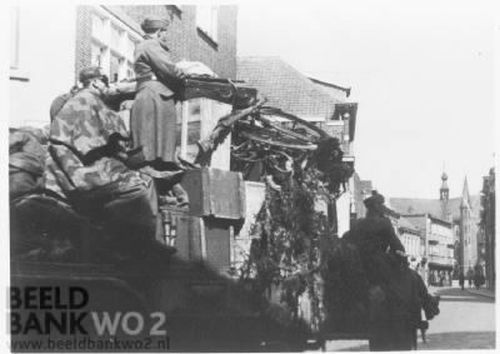 Germans fled on a massive scale September 5th 1944. Source: www.beeldbankwo2.nl.
Germans fled on a massive scale September 5th 1944. Source: www.beeldbankwo2.nl.After the war
After the liberation Joke Folmer finished her studies and she went to work for the Trusteeship Council in Amsterdam. There she continued to work for many years and, later on, she went to Groningen, to do the same work.
After the war it became known that Joke's favourite nephew, Jan Folmer, had chosen the other side. He had joined the Waffen-SS and was wounded at the Eastern Front. After the war, Jan Folmer showed remorse for his actions and Jan and Joke reconciled with each other. Journalist Peter Gerritse wrote a book about these two families with very different war experiences, entitled: "The resistance wife and the SS."
Joke Folmer has lectured about her war experiences. Not only on commemorative events, but also in schools. As she says about it in an interview: "If I talk at schools about the war, I find it important to involve young people, otherwise it is so distant. I always want to know which monument is near the school and ask them whether their grandparents have told them something about the war. Then the stories usually start. I tell no horror stories, but also the good things about the friendships and solidarity. I ask them what they would do to rid themselves of boredom in a prison cell and tell them how important singing for us was in prison".
Joke Folmer received several awards for her work during World War II. She is the bearer of: - The Bronze Lion (Royal Decree, December 22nd, 1951) - The Resistance Cross - The Medal of Freedom with Golden Palm (one of the highest American honours) - The George Medal (high, British award for citizens) - Croix de Combat.
Joke Folmer died on Schiermonnikoog in December 2022 at the age of 99.
Definitielijst
- resistance
- Resistance against the enemy. Often also with armed resources.
- Waffen-SS
- Name of Military section of the SS.
Images
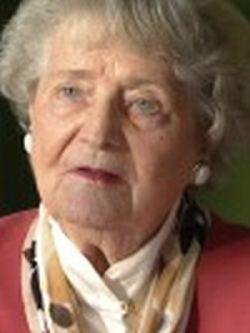 Joke Folmer at a later age. Source: www.deoorlog.nps.nl).
Joke Folmer at a later age. Source: www.deoorlog.nps.nl).Information
- Translated by:
- Chrit Houben
- Published on:
- 21-10-2012
- Last edit on:
- 17-11-2023
- Feedback?
- Send it!

